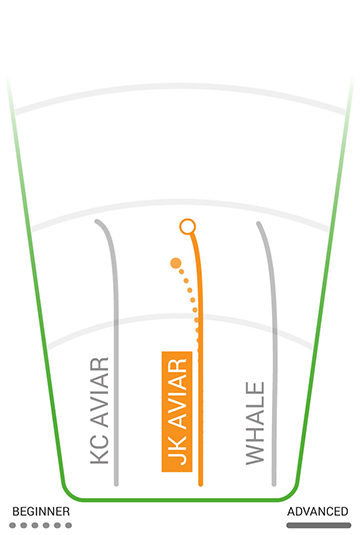What Are You Throwing on a 250′ Tunnel Shot?
The short tunnel shot. It’s a hole that strikes fear into some disc golfers, while others are licking their chops at a must-get birdie opportunity. What’s the difference between these opposite feelings you might have when stepping up to this tee pad? Well, let’s dissect this topic a little further…
Whether it’s a tight double-mando or a true tunnel shot in front of you, the three factors that will probably have the most impact are shot selection, disc selection and overall confidence that you can hit the line you’ve envisioned in your head.
Shot Selection
There are a couple of ways to think about what shot you intend to throw on any given hole. A wide open design will allow you to throw just about anything you want. A technical disc golf hole presents a different challenge. Experienced players will generally be thinking about attacking for a birdie on a 250′ tunnel shot. They will look at the tunnel and see where the basket is positioned at the end—left, right or straight ahead. They will probably know the course and which dangers lurk behind and around the basket. They will know what the ground is like leading up to and around the basket to prepare for any skips or slides once the disc lands. They will also know where any bail-out areas are. The basket may be on the left, but perhaps there is a little more room to the right. You can still be well inside circle 1 with a well-executed shot that takes more trouble out of play.
Beginner disc golfers may just want to pick out one gap they want to hit. Even if it’s fairly close to the tee, learning to hit gaps is a good way to build confidence. It also allows you to focus on one simple, achievable target rather than being intimidated by the full tunnel ahead.
Envision the shot shape that feels right for you. Is the disc gliding dead straight the whole way? Is it flipping to flat and hyzering out at the end? Is it a soft anhyzer that gently drifts right? Or, is it more of a flex S-line you see if you have the room to work it?
Disc Selection
Next, it’s all about disc selection. You’ve envisioned the shot you want to make. Now, you want choose a disc that will give you the flight characteristics to execute the shot. It is usually smart to throw smoothly and let the disc do the work for you on these types of tunnel shots. Throwing as hard as you can and hoping to hit the gap is usually a recipe for disaster!

Which disc you use will likely be determined by your arm speed and your overall skill level, as well as the shot shape you have in mind. Players with more power will almost always be pulling out a putter when staring down a tunnel shot, especially if there is enough of a ceiling to let the disc glide to the target. The XT Nova has always been one of Innova’s most popular super-straight putt and approach discs and the rim is extra grabby once it hits the ground. Others may prefer a trusty Aviar that offers a fairly neutral flight path and tons of glide.
Disc golfers with average arm speeds might opt to throw a mid-range. A disc that is moderately understable like a Mako3 or Wombat is a great call. You can flip them to flat with a slight hyzer release or put them on that beautiful soft anny line you’ve envisioned in your head. For those of us who don’t have much power or aren’t confident in using a putter or mid on a full throw, the Innova Leopard3 is an excellent fairway driver option. It offers a faster speed, comfortable rim and similar neutral-to-understable flight characteristics as the mids listed above.
Most forehand-dominant players will reach for something with a touch more stability to hold a straight line or have a little flex in the shot shape. You might want to look at a Rhyno or Pig as good throwing putter options, a Roc3 as a comfortable mid or a TeeBird3 as a straight-flying fairway.
Confidence
Surely, feeling good about your shot selection and disc choice will help you feel much more confident when throwing this tight tunnel shot. Otherwise, it comes down to practice, form and repetition. The more you play this particular hole and throw this type of shot, the more confidence you will gain over time. If you are playing a casual disc golf round by yourself or practicing the course before a tournament, don’t be afraid to try multiple shots and multiple discs (as long as you’re not holding other players up too much—always be courteous on the course).
Remember what works and what doesn’t, and then stick to your most consistent option when the real round begins. Set your game plan for the hole and don’t be discouraged if you mess up. Even the world’s best players hit the first available tree sometimes. We’ve all been there. The more you know your game and your discs, the more you’ll be dying to play the 250′ tunnel shot hole as one of the course’s best birdie opportunities.
So, what are you throwing for a 250’ tunnel shot? What other topics would you like to see on the DGU/Innova Disc Golf Blog? Let us know in the comments below.
